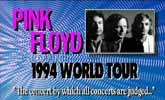

David Gilmour used an E-bow on 'Take It Back', on his Gibson J-200 acoustic.
'High Hopes' was the 1st song written for the album, but the last one finished.
The Division Bell tour was one of the most ambitious tours ever staged. The daily operating costs came to more than $752,000.00 per day.
33 trucks carried the stage, there were 11 tour busses, and 16 trucks for production, catering and power.
33 trucks leapfrogged across the country
with each stage to be set up in advance.
There were 3 stages, and 3 separate crews
(red crew, blue crew, green crew).
The size of the crew varied according to
the venue, but the average was in excess
of 200 people.
Each stage measured 60 meters wide, by 22
meters deep by 23.5 meters high and incorporated
1,400,000 pounds of steel.
Each stage took 3 days to build, approx. 18 hours
to prepare, approx. 7 plus hours to break down,
and 2 days to fully dismantle for load-out.
 |
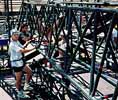 |
 |
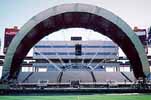 |
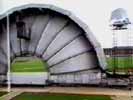 Special drains were built into the floor of the
stage to remove rainwater quickly and safely.
Special drains were built into the floor of the
stage to remove rainwater quickly and safely.
The stability of the stage was due in part to large
bladders filled with water to help hold it down.
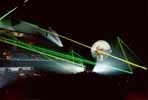 Rocklite was the 1st laser co. to use copper-vapor
lasers and the Division Bell tour was the 1st tour to
ever incorporate these types of lasers into a show.
The tour had 2 complete 50W systems.
They were apparently classified, until shortly before
the tour, under the U.S. Government's Star Wars
Project. They were so powerful that, in the U.S.,
FAA clearance was required before each concert, so
that the airspace over each venue could be closed to
air traffic.
The copper-laser system is used mainly for high-speed
photography, nuclear research, and splitting atoms.
Rocklite was the 1st laser co. to use copper-vapor
lasers and the Division Bell tour was the 1st tour to
ever incorporate these types of lasers into a show.
The tour had 2 complete 50W systems.
They were apparently classified, until shortly before
the tour, under the U.S. Government's Star Wars
Project. They were so powerful that, in the U.S.,
FAA clearance was required before each concert, so
that the airspace over each venue could be closed to
air traffic.
The copper-laser system is used mainly for high-speed
photography, nuclear research, and splitting atoms.
The lighting cues were driven by state of the art Apple Macintosh computers.
600 aircraft landing lights were used at the foot of the stage.
The tour was one of the 1st occasions where the Turbosound Flashlight PA system was used on a full- scale stadium production..delivered 232,000 Watts of music power.
The largest mirror ball in existence was built for
the tour, by Stagecraft. Diameter 16', final height
70', became 24' wide when opened.
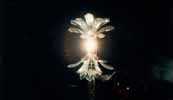 |
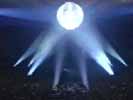 |
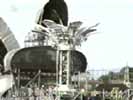 |
21 phone lines were provided at each venue, allowing the band and crew to communicate with friends and family, forthcoming venues, promoters, record company and management offices, by both phone and fax.
Feeding the crew, technicians, family and friends of the band, was no small feat, they daily consumed 1,200 bags of tea, 1,200 cans of soft drinks, 1,000 eggs, and lots of bread baked on site, among other foodstuffs.
Former PF LD Peter Wynne Willson's liquid light show made a reappearance...his first with the band since 1968.
March 29, 1994...day before the tour's opening night, the Pink Floyd air ship 'Division Belle', spent the day flying over Miami, Florida beaches.
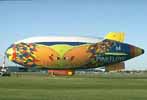 The airship 'Division Belle' was one of two blimps
used as promotional tools for the '94 tour.
The 'Division Belle' became known for it's daring
and historic flight, East to West across North
America, against the jet stream during the worst
weather months of 1994 for flying aircraft of any
type, especially an airship.
The airship 'Division Belle' was one of two blimps
used as promotional tools for the '94 tour.
The 'Division Belle' became known for it's daring
and historic flight, East to West across North
America, against the jet stream during the worst
weather months of 1994 for flying aircraft of any
type, especially an airship.
It was painted by artist Burt Dodge of Elizabeth
City, North Carolina.
When the airship returned to Elizabeth City, N.C.,
it was destroyed by a sudden thunderstorm on June
27, 1994.
The hull or envelope of the airship was cut into
4" x 4" squares and sold to collectors.
The 2nd ship was the European blimp...this airship
was actually a Lightship A-60+, which means that it
uses a translucent fabric and is lit internally at
night.
This ship was flown for a three month promotion
in the early summer of 1994 in England and Europe
- at the same time as the 'Division Belle' flew in
America.
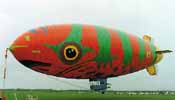 It was a 130 foot long illuminated "fish" flying
largely un-announced over towns and cities at night
to generate press coverage.
The ship subsequently went on to operate for a
variety of other clients across Europe including
Hofbrau Beer in Germany, Philips Electronics and
Ballantines Whiskey and in South Africa promoting
MTN Communications.
It was a 130 foot long illuminated "fish" flying
largely un-announced over towns and cities at night
to generate press coverage.
The ship subsequently went on to operate for a
variety of other clients across Europe including
Hofbrau Beer in Germany, Philips Electronics and
Ballantines Whiskey and in South Africa promoting
MTN Communications.
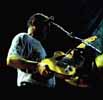
April 5, 1994...the concert at Rice Stadium, Houston,
Texas was cut short due to a tremendous rain storm.
April 22, 1994...at the Alameda Oakland Coliseum in Oakland, California, 'One Slip' was played for the only time during the tour.
May 6th, 1994...the band's mirror ball attracted a giant cloud of fireflies, who made an unexpected but beautiful contribution to the show.
May 10th, 1994...the day of a total eclipse of the sun, Pink Floyd played in Raleigh, NC.
May 14, 1994...during this New Orleans concert, a police
officer shot an audience member who pulled a gun when
his wife was arrested for failing to extinguish her
marijuana cigarette.
The fan was shot in the abdomen, but his wounds were not
serious. He was later charged with aggravated assault,
illegal possession of a firearm and resisting arrest.
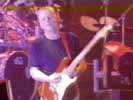
May 14, 1994...Dave Gilmour states that his performance
of 'Comfortably Numb' was the best
he had ever done.
July 5-7, 1994...'Brain Damage' and 'Eclipse' were rehearsed during the sound check on the 6th.
July 15, 1994...Detroit audience was treated to the first performance of 'Dark Side of the Moon' in its entirety since Knebworth 1975. It made up the full 2nd half of the concert.
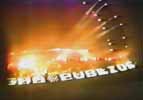 July 18, 1994...last concert of the American tour. The famous
"Enigma Publius" showed up in the lights at foot of the stage
at the East Rutherford N.J. show...following an announcement
in the alt.music.pink-floyd newsgroup by Publius that something
would happen to verify the existence of the Enigma.
Following the concert, two Boeing 747's and a massive Russian
Antonov were chartered to fly equipment to Europe for the next
concert a mere four days later.
July 18, 1994...last concert of the American tour. The famous
"Enigma Publius" showed up in the lights at foot of the stage
at the East Rutherford N.J. show...following an announcement
in the alt.music.pink-floyd newsgroup by Publius that something
would happen to verify the existence of the Enigma.
Following the concert, two Boeing 747's and a massive Russian
Antonov were chartered to fly equipment to Europe for the next
concert a mere four days later.
July 22, 1994...30 special edition "Pink Floyd" Volkswagen Golf's were built.
July 25, 1994...MTV was granted unprecedented access, filming backstage and interviewing Gilmour, Mason and Wright, plus several members of the touring band and even the road crew. They later broadcast these interviews, together with complete performances of 'Keep Talking' and 'Learning To Fly' from the concert and 'What Do You Want From Me" recorded in Lisbon.
July 29, 1994...David Gilmour married Polly Samson at Marylebone Registry Office. The reception was held in Twickenham.
August 7, 1994...as a birthday treat, Tim Renwick was invited by Dave Gilmour to step in for the solo in 'Learning to Fly'.
August 17, 1994...the band, their families, Steve O'Rourke and
members of the road crew spent the hours before the concert as
guests of Volkswagen at their Ehra-Lessien test track, where they
were invited to test-drive various models, including the new
"Pink Floyd" specials.
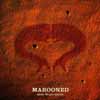
August 29-30, 1994...Norway, 'Marooned' is performed both
dates..this is the only time 'Marooned' is performed in front
of audiences during the entire '94 tour. (It was performed
at numerous soundchecks however)
August 29, 1994...Dave Gilmour worked in a bit of 'Norwegian Wood' into the intro to 'Run Like Hell'.
September 7, 1994...President Vaclav Havel was among the 115,000 crowd for the Pink Floyd first ever show in the former Czechoslovakia. He then entertained the band to dinner, apparently talking well into the night with David Gilmour.
October 12, 1994...opening night concert at Earls Court was cancelled shortly after the intro began when a block of seats holding 1,200 people collapsed.
The Oct. 16 Earls Court show was the 100th gig of the 1994 tour.
Nick Mason wore his famous cowboy hat for the Oct. 17 Earls Court show of the 1994 tour.
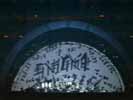
October 20, 1994...Earls Court, London...on Mr. Screen
The "ENIGMA" Signal appears.
October 28, 1994...Earls Court, London, Douglas Adams, author of "Hitchhiker's Guide to the Galaxy", and person responsible for naming TDB, performs as a guest artist...playing rhythm guitar on 'Wish You Were Here'.
During 'WYWH', Oct. 29, Earls Court, the girls came on stage with
head scarves on and cigarettes in their mouths, sweeping and
cleaning the stage...David was laughing so much he had difficulty
singing.
TDB 1994 tour ends.
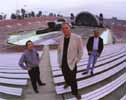
"I'm quite happy for people to interpret it any way they like. But maybe a note of caution should be sounded because you can read too much into it. "A Great Day for Freedom," for example, has got nothing to do with Roger or his "wall." It just doesn't. What else can I say"? Dave
"I just wanted to make it a more reflective album. I read some critics that said it's a bit soporific -- so be it, that's the choice we made." Dave
"I really like "The Division Bell" myself, although I wouldn't say it's an immediate album. You have to put a bit of work in to get out of it the riches that are there." Dave
"So, if you like, the first thing that got written for the album ('High Hopes') was much more personal than I've tended to be. And I suppose it set the scene for what was to follow." Dave
"What was really nice about the recording was that myself and Rick and Nick came together and worked well as a unit in a way that we hadn't done for many, many years." Dave
"It feels like a good start. It feels like there's better things to come. I'm really, really happy and proud of this album." Dave
"I'm just your average, all-round, drop-in guitarist." Tim Renwick
"But, you know, these guys (PF) have always been very serious about what they do, and that is very admirable. Rock and roll has turned into the modern day classical music." Tim Renwick
"One night we went on, and when I hit the overdrive pedal for my solo on "Learning To Fly" everything just packed in. You've got the spotlight on and nothing's coming. It was just the most horrible feeling - especially in front of 60,000 people. It was like, "And now, ladies and gentleman ... nothing!" [laughs] Tim Renwick
"David is very easygoing, but he expects things to be right, and he is used to them being right." Phil Taylor
"Dave performs all of his effects in real time. He likes to have control in case something is not sounding right on stage. It allows him to swap effects and improvise, depending on his mood. He has a very good ear, and is continually changing his effects to get the sound that he wants for any given show." Phil Taylor
"The thing about the Floyd is that they're always prepared to take chances, and new things evolve because of that. They're still right on the cutting edge." Marc Brickman
"The response to 'The Division Bell' and the tour was beyond our wildest dreams. To still be pulling in crowds of this magnitude [an average of 45,000 per night in America] is pretty mind-blowing." Dave
"Andy, Dave, myself, and all the guys had enormous fun on the road with the Floyd, and it probably rates as the most enjoyable tour I've been on in my 28 years as an engineer." Colin Norfield
"I can't say that my greatest desire is to be innovative or break new frontiers. I just hope to make music that moves people a little bit and makes them think. We don't claim to have solutions to life's great problems." Dave
"I don't find it bleak or despairing, good music allied with depressing sentiments can be very uplifting. The darker emotions are the more powerful ones. Love songs, the ones that work, are about lost love." Dave
"But there will be another album, definitely. It's not that we've stopped. I'd be very surprised if we don't do another album and tour within the next few years." Rick
"We went into the studio to see if we could invent anything as a band rather than entirely electronically and I think it was successful for this album. It was significant that there was something to be achieved with the three of us." Nick
"I think playing to an audience is one of the best parts of the whole business." Nick
"And I was never that confident with my voice and I think it is true to say on "Division Bell" I was very nervous about going in to sing the song but I actually was quite pleased with the way it sounded." Rick
"The logistics of mounting a tour like this are obviously huge, and luckily I don't have to do it. It is a massive organization. What I *really* like is being up on stage." Rick
"There is pressure to make the show bigger and better, but we want that pressure and we enjoy it." Rick
"We would have the option of going out with a much smaller show but that is not what interests us and that's great about being in the position we're in...the fact that we *can* go out and do the ultimate techno show and do exactly as we please." Nick
"I'm not really a control freak, but in the end I like things done properly and I think we're quite good at it." Dave
"We don't play that perfect, Dave is slow on the guitar, but we play with soul." Rick
"Playing live is very satisfying, it's terrific fun." Dave
"It's a once in a lifetime experience. How did I get here? One never dreamt of playing with Pink Floyd because they had a bass player... it's very very special and I would recommend it!" Guy Pratt
"My job to start out with is to take what Rick does and expand upon it and we balance it out pretty evenly live...we are very suited to each other." Jon Carin
"Dave lets me do what I like, just about...and I do know what the band is about, so it's more of a mood thing actually." Dick Parry
"A lot of Pink Floyd's 2nd guitar parts are fairly sort of simple, you just have to kind of be there and allow plenty of space for David's lead stuff...it's actually very tempting to play more because there is a lot of space in the music." Tim Renwick
"I'm putting my life's blood into it. But Pink Floyd is not only me. I am bound by other people's desires and choices and politics and needs. The whole thing is a constant compromise of ideals and art all the way through." Dave
"I'm in a cocoon. Entirely locked in a cocoon. If you do it
the best way you can for yourself then it will get across to other
people. It seems to me that it's vitally important that I do sing
every syllable with meaning. You've got to believe it." Dave